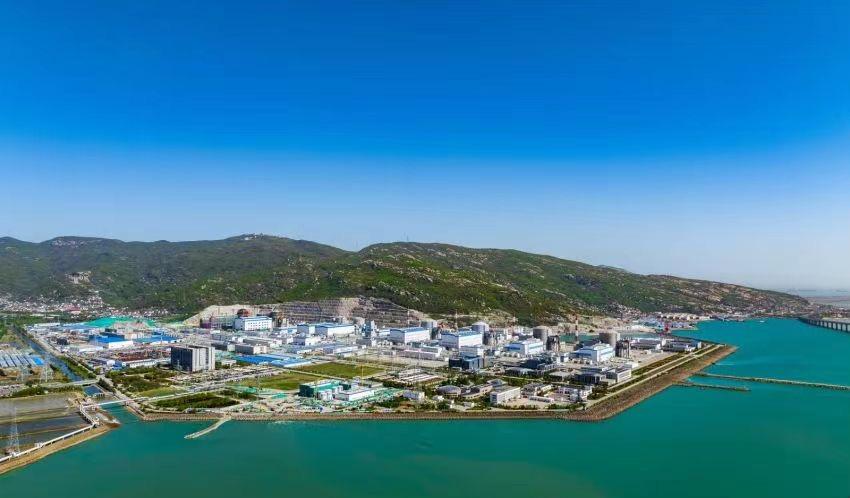
 0 Comment(s)
0 Comment(s) Print
Print E-mail China.org.cn, June 19, 2024
E-mail China.org.cn, June 19, 2024
According to CAEA, on June 19, China's first industrial nuclear steam supply project, "Heqi No. 1", was officially completed and put into operation at Tianwan Nuclear Power Station (TNPS), which is invested and held by China National Nuclear Corporation (CNNC). This marks the expansion of China's comprehensive nuclear energy utilization from single-purpose power generation and urban residential heating to the field of industrial steam supply.
The "Heqi No. 1" project, recognized as one of the first batch of "green and low-carbon advanced technology demonstration projects", is characterized by "green, safe, stable, and efficient". The project uses secondary circuit steam, generated from the turbine system of TNPS Unit 3&4, as the heat source. It employs a multi-layer isolation design among the primary circuit, secondary circuit, and steam circuit in the NPP, ensuring physical isolation while producing industrial steam. This steam is then transported through industrial gas pipelines to the petrochemical industrial base via multi-stage heat exchange, replacing traditional coal consumption and addressing the heat and power needs of petrochemical enterprises.

China's first industrial nuclear steam supply project in Jiangsu province. [Photo provided to China.org.cn]
Upon completion, the project will deliver 4.8 million tons of zero-carbon steam annually from TNPS to the petrochemical base of Lianyungang city. This is equivalent to reducing the combustion of 400,000 tons of standard coal each year, cutting carbon dioxide emissions by 1.07 million tons, sulfur dioxide by 184 tons, and nitrogen oxides by 263 tons annually. It is also comparable to planting 2,900 hectares of new woods each year, saving over 700,000 tons of carbon emission allowances for the petrochemical base annually. This initiative not only opens a new path for nuclear energy to support the green upgrade of traditional industries but also injects stronger momentum into the high-quality development of the regional economy.
Huang Ping, Secretary-General of CAEA, stated that in recent years, CAEA has vigorously promoted the comprehensive utilization of nuclear energy and the widespread application of nuclear technology in industry, agriculture, healthcare, environmental protection, and safety, etc. It has supported the implementation of several projects, including this steam supply. Looking ahead, CAEA will continue to nurture and develop promising nuclear technology projects and applications. It aims to build a better home centered around the themes of green, prosperous, healthy, peaceful, innovative, and cultural. This initiative is designed to support the national economy and enhance the well-being of the people.
Academician of Chinese Academy of Engineering, Ye Qizhen, stated that the integrated utilization of nuclear energy coupled with high energy-consuming industries will further highlight its value in the pursuit of carbon neutral. This approach can meet the diverse energy needs of energy-intensive industries and provide decarbonization solutions for high-carbon emission sectors. It supports the development of large-scale chemical and industrial bases in the country, aligning closely with China's plans for green and low-carbon industrial transformation.
Zhang Yi, Chairman of JNPC, stated that building a beautiful China and continuously improving the quality of the ecological environment fundamentally relies on accelerating the transition to a green and low-carbon development model. The "Heqi No. 1" project, developed in collaboration with various partners, serves as a model of clean steam supply for the national petrochemical industry and will inject new impetus into China's high-quality development.
It is understood that in addition to applications in heating and steam supply, nuclear energy can be widely utilized in fields such as isotope production, hydrogen production, and seawater desalination. Currently, China's comprehensive nuclear energy utilization is showing a diversified development trend. Additionally, nuclear technology has been widely applied in various fields, including industry, agriculture, healthcare, environmental management, and public security. This has led to the formation of a significant industrial scale and has achieved remarkable economic and social benefits.